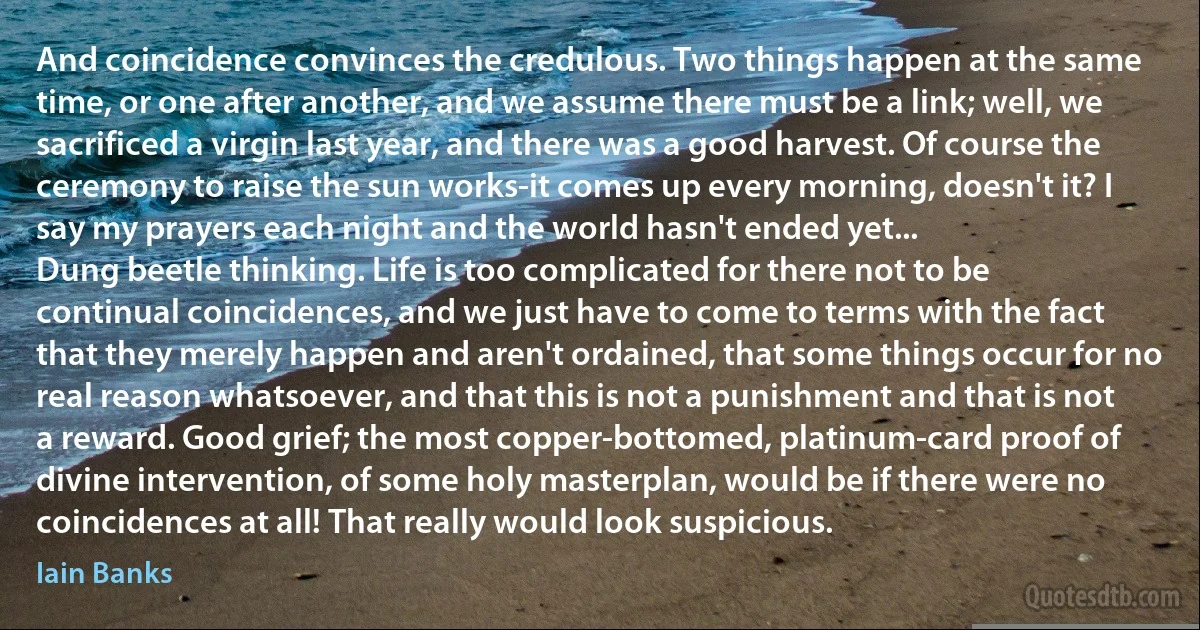
And coincidence convinces the credulous. Two things happen at the same time, or one after another, and we assume there must be a link; well, we sacrificed a virgin last year, and there was a good harvest. Of course the ceremony to raise the sun works-it comes up every morning, doesn't it? I say my prayers each night and the world hasn't ended yet... Dung beetle thinking. Life is too complicated for there not to be continual coincidences, and we just have to come to terms with the fact that they merely happen and aren't ordained, that some things occur for no real reason whatsoever, and that this is not a punishment and that is not a reward. Good grief; the most copper-bottomed, platinum-card proof of divine intervention, of some holy masterplan, would be if there were no coincidences at all! That really would look suspicious.
Iain BanksRelated topics
beetle comes course dung divine good grief harvest holy intervention last life link morning night proof punishment raise real reason reward say sun thinking time well world year yet thingsRelated quotes
Many of my Hamptstead friends may remember this 'young lady' [an ash tree] at the entrance to the village. Her fate was distressing, for it is scarcely too much to say that she died of a broken heart. I made this drawing [Study of Trees, pencil on paper, circa 1821] when she was in full health and beauty; on passing some times afterwards, I saw, to my grief, that a wretched board had been nailed to her side, on which was written in large letters: 'All vagrants and beggars will be dealt with according to law.' The tree seemed to have felt the disgrace, for even then some of the top branches had withered. Two long spike nails had been driven far into her side. In another year one half became paralysed, and not long after the other shared the same fate, and this beautiful creature was cut down to a stump, just high enough to hold the board.

John Constable
If we recognize, following the materialist theories, that only the physical nature exist, and that man contain ("renferme", Fr.) no higher essence, divine, which, by one side of his being, raise (promote or improve...) him above his animal nature, it would be a question ("il ne saurait être question", Fr.) neither of obligation, nor of moral responsability; then the supreme good would consist for him, indeed, to satisfy his appetites and his natural inclinations (fondness or partiality, -"penchant", Fr.), to look for the pleasure and flee from (scud, shun, avoid, -"fuir", Fr.) pain. In this case, there could be neither religion nor moral, since religion is precisely what raise man above vulgar (or common, - "vulgaire", Fr.) reality, and that moral is the very negation of selfishness.

African Spir
True Religion does not manifest itself outwardly, and impels man to no course of external conduct which he would not otherwise have adopted, but that it only completes his true In ward Being and Dignity. It is neither an Action, nor an incentive to Action, but a Thought:-it is LIGHT, and the One True Light, which bears within it all Life and all the forms of Life, and pervades their innermost substance. Once arisen, this Light flows on spontaneously forever, spreading itself forth without term or limit;-and it is as idle to bid it shine, as it would be to address such a command to the material sun when it stands in the noon-day heavens. It does this without our bidding; and if it shine not, then has it not arisen. At its uprising, Darkness, and the brood of spectres and phantasms which are born of Darkness, vanish of themselves.

Johann Gottlieb Fichte
Comets are flying around the solar system. As they near the sun, they develop a tail as material is blown off by the solar wind. Most astronomers agree that comets cannot be more than 10,000 years old. They would have completely disappeared by now. Some scientists have recognized this as a serious problem for the theory that the earth is billions of years old, so they have proposed a new theory that new comets are constantly being introduced into the solar system to replace the old ones that burn out. They say they are coming from the "Oort Cloud.” No one has ever seen this Oort cloud, Oort never saw the Oort cloud! There is NO scientific evidence for its existence, but in their mind, this answers the serious problem the short lives of comets creates. There is a simpler answer, of course: the universe is NOT billions of years old!

Kent Hovind
Let us imagine that the aboriginal-original human specimen was one of two brother apes, A and B; they were alike in every respect; both were animal space-binders; but something strange happened to B; he became the first time-binder, a human. ... He had thus a new faculty, he belonged to a new dimension; but, of course, he did not realize it; and because he had this new capacity he was able to analyze his brother "A"; he observed "A is my brother; he is an animal; but he is my brother; therefore, I AM AN ANIMAL." This fatal first conclusion, reached by false analogy, by neglecting a fact, has been the chief source of human woe for half a million years and it still survives. ... He [then] said to himself, "If I am an animal there is also in me something higher, a spark of some thing supernatural."

Alfred Korzybski
